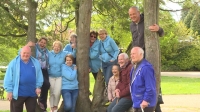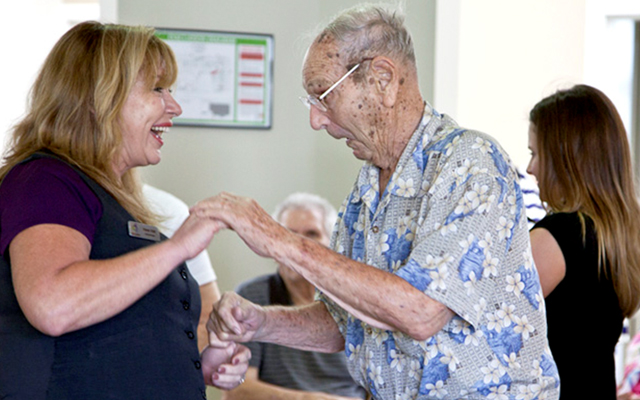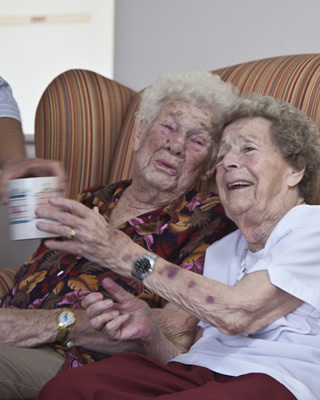Enabling People to Live Well with Dementia | Communication, Interaction and Behaviour in Dementia Care



This session will introduce ways to facilitate effective communication with people living with dementia. It will help you to understand the communicative impairments as well as the retained abilities that individuals with dementia may experience and the variety of ways people with dementia may communicate their needs and preferences.
Learning Objectives
By the end of this session you will be able to:
- Describe different ways of communicating
- Explain the importance of communication
- Reflect on the impact of communication impairments on people living with dementia, their carers and supporters
- Identify ways in which you can effectively support communication with people living with dementia
In this session, we will reflect on the importance of communication and consider the ways in which we can recognise different ways of communicating and support effective communication with people living with dementia.
This session has been mapped to the Dementia Training Standards Framework and is designed to support the Dementia Action Alliance Dementia Statements.
Before commencing this session you may wish to complete:
- Module 1 - Introduction to Living with Dementia/Dementia Awareness (407-0030)
Lindsey is a Senior Dementia Care Practice Development Consultant and Trainer within the Centre for Applied Dementia Studies at the University of Bradford. Her role involves developing and delivering face-to-face and cascade training to health and social care organisations throughout the UK and internationally. Lindsey leads the delivery of training in Dementia Care Mapping for Realising Person Centred Care; Dementia Care Mapping for Leading Practice Change; and the Short Observational Framework for Inspection, which is used by health and social care inspectors internationally.
Her areas of special interest include promoting effective and meaningful person-centred communication and supporting people living with dementia who experience complex eating and drinking difficulties, particularly at the end of life. Lindsey is an Alzheimer's Society Clinical Training Fellow conducting a PhD to explore the eating and drinking experiences of people living with dementia and swallowing difficulties in care homes. She completed her MSc in Dementia Studies in 2012 and joined the Centre for Applied Dementia Studies at the University of Bradford in October 2013.
A registered speech and language therapist she has worked in a variety of settings, including acute hospitals, mental health hospitals, care homes, day centres and in people's own homes. She has been responsible for developing and embedding specialist speech and language therapy services within several NHS Mental Health Trusts in England. Since 2006, Lindsey has specialised in dementia care practice. Lindsey maintains strong links with the field of speech and language therapy to maintain her clinical knowledge and skills. She is regularly invited to give keynote lectures.



- Anaesthesia Fundamentals | Physiology | Ventilatio...
- Posted By eIntegrity Healthcare e-Learning
- Posted Date: 2024-12-26
- Location:Online
- This session describes how and why ventilation and perfusion vary in the healthy lung. Causes of hypoxia, such as hypoventilation, increased dead space and shunt, are discussed to help the trainee explain and manage hypoxia clinically.
- Anaesthesia Fundamentals | Physiology | Pulmonary ...
- Posted By eIntegrity Healthcare e-Learning
- Posted Date: 2024-12-26
- Location:Online
- This session covers the measurement and clinical importance of lung volumes, including functional residual capacity and dead space. Information regarding the performance and interpretation of flow-volume loops is also included.
- Anaesthesia Fundamentals | Physiology | Co2 Carria...
- Posted By eIntegrity Healthcare e-Learning
- Posted Date: 2024-12-26
- Location:Online
- This session covers the physiology of how carbon dioxide is carried by blood, including its conversion into bicarbonate ions and the role of the red blood cell and haemoglobin in this process. The session also describes how buffers work, and the fundament
- Anaesthesia Fundamentals | Physiology | Function o...
- Posted By eIntegrity Healthcare e-Learning
- Posted Date: 2024-12-26
- Location:Online
- This session focusses on the function of haemoglobin in oxygen (O2) carriage from the lungs to other tissues where cells are supplied with the O2 required for oxidative phosphorylation in the mitochondria. We will cover the structure
- Anaesthesia Fundamentals | Physiology | Gaseous Ex...
- Posted By eIntegrity Healthcare e-Learning
- Posted Date: 2024-12-26
- Location:Online
- This session will introduce you to the physiological effects of altitude and the adaptations that occur with acclimatization. It also introduces the pathology and physiology of high pressure and decompression.






